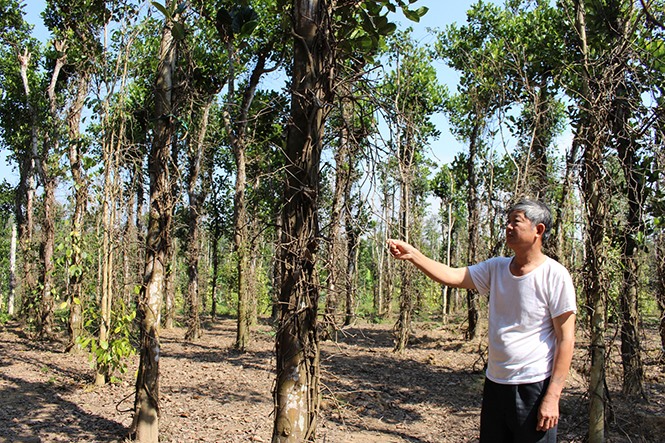 Society
Society

Around 15 hectares of pepper plants have withered and died in a commune in the central Quảng Bình Province, despite desperate efforts by local farmers to save the plants.
 |
| A farmer from Nông Trường Việt Trung Township stands in his dying pepper farm. — Photo baoquangbinh.vn |
QUẢNG BÌNH — Around 15ha of pepper plants have withered and died in a commune in the central Quảng Bình Province, despite desperate efforts by local farmers to save the plants.
Authorities of Nông Trường Việt Trung Township said farmers ignored repeated warnings that the local soil and weather conditions would not suit pepper plants.
Nguyễn Thị Quýt, a local farmer, said she cannot explain why the 500 pepper plants in her farm gradually withered and died.
When the plants started withering slowly 10 months ago, she purchased and sprayed chemicals recommended by pesticide traders to stop root decay, but the chemicals only hastened the damage, Quýt said.
The local farmers’ association said 22 farms in the commune lost pepper plants, with 10 farms losing the plants entirely. Association chairman Nguyễn Đức Phong said all the affected pepper plants died in a similar manner, with their leaves withering and roots decaying. Phong has sent reports to related agencies, appealing for help.
Local farmers said they have suffered huge losses, as the pepper was planted to replace rubber after a storm destroyed rubber trees in 2013.
“At least 300 of the 1,000 pepper plants in my farm are dead, and others are withering. If all plants die before we can harvest the pepper, my family will have to go hungry as we have put all our money in the farm,” said farmer Nguyễn Minh Châu.
One hectare of pepper farming costs local farmers around VNĐ350 million (US$15,000), and pepper plants yield seeds after three years. Most of the farms have used bank loans to do pepper farming as they had no funds after the loss of rubber four years ago.
“I believe the actual affected area is even larger [than 15 hectares], as some farmers have not reported their damaged crop to local authorities,” said Phan Văn Trưng, the township’s deputy chairman. Trưng said they have not reported the loss as they did not consult authorities before they started planting pepper.
Soil and climate conditions are different across different localities in the country, and the main cause for withering is underground flooding, according to Trưng. Local authorities have not included the pepper plant in the township’s agriculture development plan, but despite that, local framers chose to plant it.
“The first time, when many farmers started growing pepper, we conducted technical training courses, but they did not apply the information to their farms, which has led to this situation,” he said.
Farmers admitted that they learnt how to plant and grow pepper plants from each other, and that they did not make little mounds of soil, which would have helped prevent water from flooding the spot.
If farmers wanted to continue growing pepper on these farms, they would have to wait for another two years now, Trưng said. — VNS




